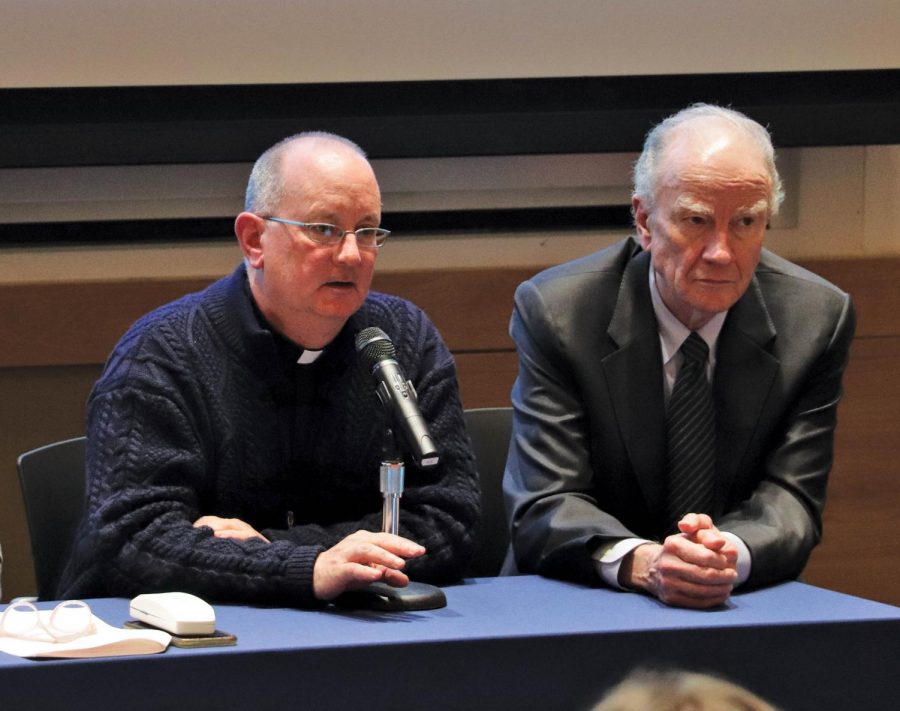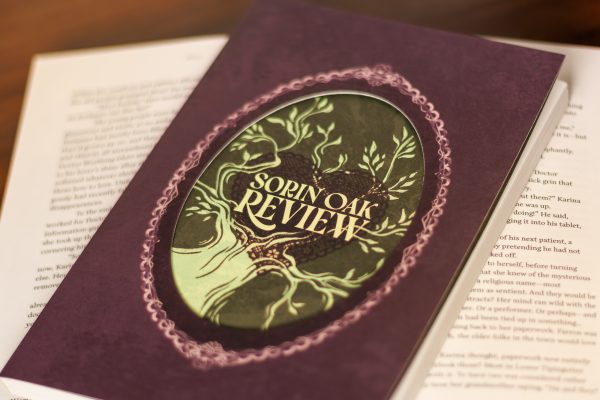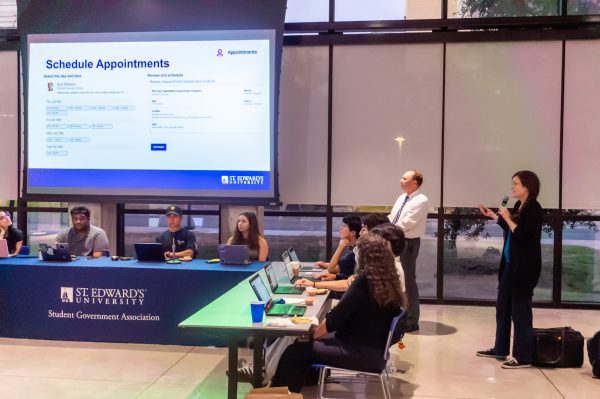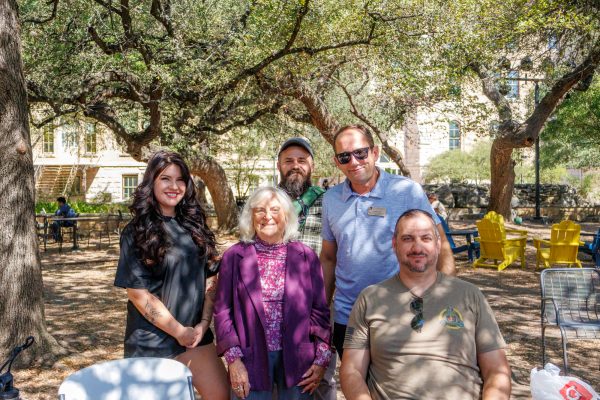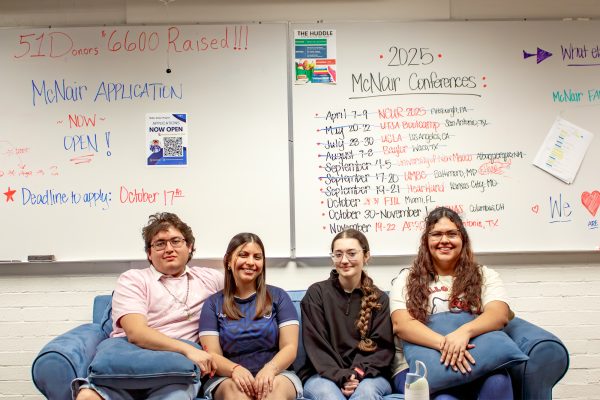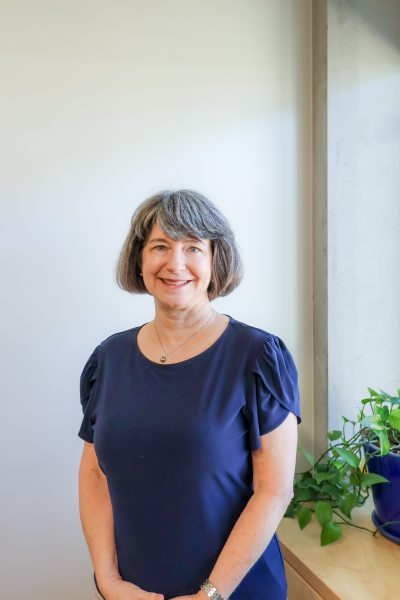Annual SGA President’s Meeting covers sustainability efforts, transportation
(Left to right) Father Peter Walsh, Director of Campus Ministry, and President Martin sit on the panel for the annual meeting. Martin emphasized the Holy Cross mission at the start of the event.
On Nov. 14, St. Edward’s Student Government Association (SGA) hosted its annual President’s Meeting at Carter Auditorium. The event, moderated by SGA Vice President Athina Castanon, addressed institutional development and university concerns. Students were able to submit questions for panelists prior to the meeting.
The panel consisted of: University President George Martin, University Provost and Vice President of Academic Affairs Andrew Prall, Christie Campbell, Vice President of Marketing and Communications, Joe DeMedeiros, Vice President for University Advancement, Lisa Kirkpatrick, Vice President for Student Affairs and Title IX Coordinator, Kimberly Kvaal, Vice President for Finance and Administration, Tracy Manier, Vice President for Enrollment Management, Justin Sloan, Vice President for Institutional Effectiveness and Planning and Chief Data Officer, David Waldron, Vice President for the Office of Information of Technology and Father Peter Walsh, Director of Campus Ministry.
The meeting began with President Martin, who reintroduced the university’s history with Father Basil Moreau as the invaluable core of current and future endeavors.
“Every single strategic plan that we’ve done really starts with the Holy Cross mission,” Martin said. “From the beginning, there was a commitment to excellence. Always excellence. We had to do what we do the best way that it can be done.”
Martin said the pursuit of excellence requires a dedication to diversity and quality, both of which actively influence students’ academic and professional careers. Inclusion does not only revolve around students but faculty and institutional finances. To adjust to a diverse society and changing world, students can learn to appreciate what diversity offers by growing alongside it under St. Edward’s guidance. Kvaal echoed this as well.
“The Office of Human Resources has recently revamped the job posting template so that when we are posting positions, we are using more inclusive language,” Kvaal said. “We reviewed where we post those positions and have some broader websites and search tools that we are using to create a more diverse pool of applicants.”
Questions about tuition inspired a response from Manier, who addressed the factors that contribute to the rising cost.
“We’re keeping in mind the university’s overall sustainability and the cost of sustaining the institution,” Manier said. “We want to deliver you a valuable education so that you’ll be able to use that education to be the kind of professional citizen you want to be in the future.”
Sustainability within the university also extends to environmental initiatives. Kvaal elaborated on campus innovations that are allowing students and faculty to take part in the protection of resources. She cited the implementation of Grub Tubs, styrofoam and battery recycling along with water and energy conservation.
“Campus-wide, we have implemented new and improved waste management programs,” Kvaal said. “There’s been work with Residence Life to raise awareness for water and energy conservation efforts. We’re also working to reduce the university’s overall carbon footprint by reducing our energy consumption and contributing to Austin’s energy programs.”
Panelists also said St. Edward’s provides access to highly-regarded resources, particularly success coaches and alumni connections. Martin said that having the ability to work with university faculty encourages students to reflect on their personal and occupational long-term goals.
DeMedeiros said that staying connected with alumni is valuable in creating job and internship opportunities for current students.
The panelists also discussed technological advances within the university, campus lighting and the lack of accessible hygiene products and how they can be made available around campus.
“What would need to happen is the request to do so, and then we would work with facilities because typically these products are found in restrooms,” Kirkpatrick said. “We would need to talk about funding and management of those items.”
Freshman political science major Lauren Henry called attention to the issue of student transportation.
“In the past, I’ve been made aware that students have been trying to push for affordable transportation. Why don’t we, as St. Edward’s students in Austin have accessibility to this?” Henry asked.
“From my understanding, SGA has tried to bring this up multiple times and the best that they could do is negotiate 35% off of a monthly pass,” Henry added. “That’s not enough because not every student rides the bus every day, so they have different models of what we can do and how we can distribute that cost. If they can be open-minded to actually work with CapMetro, they need to sit down and figure something out.”
Kirkpatrick then encouraged students to find ways of engaging with university faculty and their peers beyond the classroom.
“We know that you all experience a lot of challenges as you’re moving through your college career and beyond. Your well-being, the ability to thrive — that doesn’t just naturally happen,” she said. “We hope the resources and services that we are developing and working to improve with your feedback on campus will expand your capacity to be well and to live well.”

